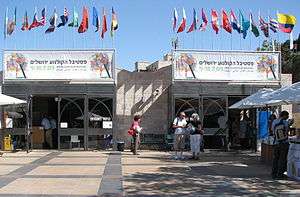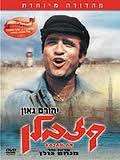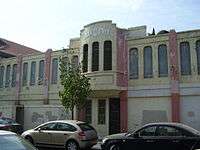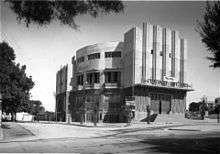Cinema of Israel
| Cinema of Israel | |
|---|---|
 | |
| No. of screens | 286 (2011)[1] |
| • Per capita | 4.4 per 100,000 (2011)[1] |
| Main distributors |
United King Globus Group Forum Cinemas[2] |
| Number of admissions (2011)[3] | |
| Total | 12,462,537 |
| • Per capita | 1.5 (2012)[4] |
| Gross box office (2012)[4] | |
| Total | €94.6 million (₪454.8 million) |
Cinema of Israel (Hebrew: קולנוע ישראלי Kolnoa Yisraeli) refers to movie production in Israel since its founding in 1948. Most Israeli films are produced in Hebrew. Israel has been nominated for more Academy Awards for Best Foreign Language Film than any other country in the Middle East.
History
Movies were made in Mandatory Palestine from the beginning of the silent film era although the development of the local film industry accelerated after the establishment of the state. Early films were mainly documentary or news roundups, shown in Israeli cinemas before the movie started.[5]
One of the pioneers of cinema in Israel was Baruch Agadati.[6][7] Agadati purchased cinematographer Yaakov Ben Dov's film archives in 1934 when Ben Dov retired from filmmaking and together with his brother Yitzhak established the AGA Newsreel.[7][8] He directed the early Zionist film entitled This is the Land (1935).[9]
In 1948, Yosef Navon, a soundman, and Yitzhak Agadati, producer of the first Hebrew-language film with his brother, Baruch Agadati, found an investor, businessman Mordechai Navon, who invested his own money in film and lab equipment. Agadati used his connections among Haganah comrades to acquire land for a studio. In 1949 the Geva film labs were established on the site of an abandoned woodshed in Givatayim.[5]
In 1954, the Knesset passed the Law for the Encouragement of Israeli Films (החוק לעידוד הסרט הישראלי). Leading filmmakers in the 1960s were Menahem Golan, Ephraim Kishon, and Uri Zohar.
The first Bourekas film was Sallah Shabati, produced by Ephraim Kishon in 1964. In 1965 Uri Zohar produced the film Hole in the Moon, influenced by French New Wave films.
In the first decade of the 21st century, several Israeli films won awards in film festivals around the world. Prominent films of this period include Late Marriage (Dover Koshashvili), Broken Wings, Walk on Water and Yossi & Jagger (Eytan Fox), Nina's Tragedies, Campfire and Beaufort (Joseph Cedar), Or (My Treasure) (Keren Yedaya), Turn Left at the End of the World (Avi Nesher), The Band's Visit (Eran Kolirin) Waltz with Bashir (Ari Folman), and Ajami. In 2011, Strangers No More won the Oscar for Best Short Documentary.[10] In 2013 two documentaries were nominated the Oscar for the Best Feature Documentary: The Gatekeepers (Dror Moreh) and Five Broken Cameras, a Palestinian-Israeli-French co-production (Emad Burnat and Guy Davidi).
Author Julie Gray notes "Israeli film is certainly not new in Israel, but it is fast gaining attention in the U.S., which is a double-edged sword. American distributors feel that the small American audience interested in Israeli film, are squarely focused on the turbulent and troubled conflict that besets us daily."[11]
In 2014 Israeli-made films sold 1.6 million tickets in Israel, the best in Israel's film history.[12]
- Memorial plaque on the house of Yerushalayim Segal in Tel Aviv
 Poster for Kazablan, an iconic Israeli film
Poster for Kazablan, an iconic Israeli film
Genres in Israeli cinema
Bourekas films
Bourekas films (סרטי בורקס) were a film genre popular in the 1960s and 1970s. Central themes include ethnic tensions between the Ashkenazim and the Mizrahim or Sephardim and the conflict between rich and poor.[13] The term was supposedly coined by the Israeli film director Boaz Davidson, the creator of several such films,[14] as a play-on-words, after "spaghetti Western:" just as the Western subgenre was named after a notable dish of its country of filming, so the Israeli genre was named after the notable Israeli dish, Bourekas. Bourekas films are further characterized by accent imitations (particularly of Jewish people originating from Morocco, Persia, and Poland); a combination of melodrama, comedy and slapstick; and alternate identities. Bourekas films were successes at the box office but panned by the critics. They included comedy films such as Charlie Ve'hetzi and Hagiga B'Snuker and sentimental melodramas such as Nurit. Prominent filmmakers in this genre during this period include Boaz Davidson, Ze'ev Revach, Yehuda Barkan and George Ovadiah.
New sensitivity films
The "New sensitivity films" (סרטי הרגישות החדשה) is a movement which started during the 1960s and lasted until the end of the 1970s. The movement sought to create a cinema in modernist cinema with artistic and esthetic values, in the style of the new wave films of the French cinema. The "New sensitivity" movement produced social artistic films such as But Where Is Daniel Wax? by Avraham Heffner. The Policeman Azoulay (Ephraim Kishon), I Love You Rosa and The House on Chelouche Street by Moshé Mizrahi were candidates for an Oscar Award in the foreign film category. One of the most important creators in this genre is Uri Zohar, who directed Hor B'Levana (Hole In The Moon) and Three Days and a Child.
History of Israeli movie theaters
In the early 1900s, silent movies were screened in sheds, cafes and other temporary structures.[15] In 1905, Cafe Lorenz opened on Jaffa Road in the new Jewish neighborhood of Neve Tzedek. From 1909, the Lorenz family began screening movies at the cafe. In 1925, the Kessem Cinema was housed there for a short time.[16]
In 1953, Cinema Keren, the Negev's first movie theater, opened in Beersheba. It was built by the Histadrut and had seating for 1,200 people.[17]
In 1966, 2.6 million Israelis went to the cinema over 50 million times. In 1968, when television broadcasting began, theaters began to close down, first in the periphery, then in major cities. Three hundred thirty standalone theaters were torn down or redesigned as multiplex theaters.[15]
 Beit Shemesh movie theater, early 1950s
Beit Shemesh movie theater, early 1950s Eden Cinema, Tel Aviv
Eden Cinema, Tel Aviv Mograbi theater, Tel Aviv
Mograbi theater, Tel Aviv Keren Cinema, first movie theater in the Negev
Keren Cinema, first movie theater in the Negev
Eden Cinema, Tel Aviv
The Eden Cinema (Kolnoa Eden) was built in 1914 despite objections by the residents of Ahuzat Bayit, the neighborhood that became Tel Aviv. The owners, Moshe Abarbanel and Mordechai Wieser received a 13-year franchise. During World War I, the theater was shut down by order of the Ottoman government on the pretext that its generator could be used to send messages to enemy submarines off shore. It reopened to the public during the British Mandate and became a hub of cultural and social activity. It closed down in 1974.[15]
Mograbi Cinema, Tel Aviv
The Mograbi Cinema (Kolnoa Mograbi) opened in 1930. It was designed in an art deco style that was popular in cinemas worldwide. The building was roofless for the first few years and was eventually topped with a sliding roof. People gathered in front of the theater to dance in the streets when the UN General Assembly voted in favor of the Partition Plan in November 1947. After a fire in the summer of 1986 due to an electric short-circuit, the building was demolished.[15]
Armon Cinema, Haifa
In 1931, Moshe Greidinger opened a cinema in Haifa. In 1935 he built a second movie theater, Armon, a large art-deco building with 1,800 seats that became the heart of Haifa’s entertainment district. It was also used as a performance venue by the Israel Philharmonic Orchestra and the Israeli Opera.[18]
Alhambra Cinema, Jaffa
The art deco Alhambra cinema, with seating for 1,100, opened in Jaffa in 1937. It was designed by a Lebanese architect, Elias al-Mor, and became a popular venue for concerts of Arab music. Farid al-Atrash and Umm Kulthum appeared there. In 2012, the historic building reopened as a Scientology center after two years of renovation.[19]
Smadar Theater, Jerusalem
The Smadar theater was built in Jerusalem's German Colony in 1928. It was German-owned and mainly served the British Army. In 1935, it opened for commercial screenings as the "Orient Cinema." It was turned over to Jewish management to keep it from being boycotted as a German business, infuriating the head of the Nazi Party branch in Jerusalem. After 1948, it was bought by four demobilized soldiers, one of them Arye Chechik, who bought out his partners in 1950.[20] According to a journalist who lived next door, Chechik sold the tickets, ran to collect them at the door and worked as the projectionist. His wife ran the concession stand.[21]
Cinema festivals
The main international film festivals in Israel are the Jerusalem Film Festival and Haifa Film Festival.
Cinema awards
Film schools
- Sam Spiegel Film and Television School
- Ma’aleh School of Television, Film and the Arts[22]
See also
- Culture of Israel
- Israeli films of the 1950s
- Jewish culture#Cinema
- List of Israeli films
- List of Israeli submissions for the Academy Award for Best Foreign Language Film
- Media of Israel
- Edison Theater (Jerusalem)
References
- 1 2 "Table 8: Cinema Infrastructure - Capacity". UNESCO Institute for Statistics. Retrieved 5 November 2013.
- ↑ "Table 6: Share of Top 3 distributors (Excel)". UNESCO Institute for Statistics. Retrieved 5 November 2013.
- ↑ "Table 11: Exhibition - Admissions & Gross Box Office (GBO)". UNESCO Institute for Statistics. Retrieved 5 November 2013.
- 1 2 "Annual Report 2012/2013" (PDF). Union Internationale des Cinémas. Retrieved 10 November 2013.
- 1 2 Editing out a frame of history, Haaretz
- ↑ Amos Oz, Barbara Harshav (2000). The silence of heaven: Agnon's fear of God. Princeton University Press. Retrieved August 5, 2011.
- 1 2 Oliver Leaman (2001). Companion Encyclopedia of Middle Eastern and North African Film. Taylor & Francis. Retrieved August 5, 2011.
- ↑ Stiftung Deutsche Kinemathek (1997). Filmexil. Hentrich. Retrieved August 5, 2011.
- ↑ Gary Hoppenstand (2007). The Greenwood encyclopedia of world popular culture, Volume 4. Retrieved August 5, 2011.
- ↑ Film about Tel Aviv school wins Academy Award Archived August 9, 2011, at the Wayback Machine.
- ↑ Gray, Julie (July 3, 2014). "Stories Without Borders: Emergent Israeli Films". Script Magazine. Retrieved 1 August 2014.
- ↑ "A glowing 2014 for the Israeli film industry". Cineuropa. Retrieved 20 January 2015.
- ↑ Shohat, Ella (2010). Israeli Cinema: East/West and The Politics of Representation. London: I.B.Tauris & Co Ltd. p. 113. ISBN 9781845113131.
- ↑ Shaul, Shiran (Fall–Winter 1978). Interview tih Boaz Davidson. Kolnoa. pp. 15–16.
- 1 2 3 4 Shalit, David (January 3, 2011). "Cinemas in Eretz Yisrael". Boeliem.com. Retrieved August 2, 2011.
- ↑ Paraszczuk, Joanna (June 5, 2010). "Reviving Tel Aviv's Valhalla". The Jerusalem Post. Retrieved August 2, 2011.
- ↑ Be'er-Sheva Tours and Trails, Adi Wolfson and Zeev Zivan, 2017, p.20
- ↑ Roe, Ken. "Armon Cinema Ha'Nevi'im Street, Haifa". Cinema Treasures. Retrieved 14 April 2012.
- ↑ Rosenblum, Keshet (August 30, 2012). "Alhambra Cinema in Jaffa reopens as Scientology center". Haaretz. Retrieved September 3, 2012.
- ↑ German Colony Cinema Once Again Under Threat of Closure
- ↑ Rotem, Tamar (April 9, 2008). "80-year-old Smadar Cinema projects special image of Jerusalem". Haaretz. Retrieved September 23, 2012.
- ↑ "Ma'aleh School of Television, Film and the Arts". Maale.co.il. 1997-02-26. Retrieved 2013-04-02.
Further reading
- Israel Studies 4.1, Spring 1999 - Special Section: Films in Israeli Society (pp. 96–187)
- Amy Kronish, World cinema: Israel, Trowbridge, Wiltshire: Flicks Books [etc.], 1996
- Amy Kronish and Costel Safirman, Israeli film: a reference guide, Westport, Conn. [etc.]: Praeger, 2003
- Gilad Padva. Discursive Identities in the (R)evolution of the New Israeli Queer Cinema. In Talmon, Miri and Peleg, Yaron (Eds.), Israeli Cinema: Identities in Motion (pp. 313–325). Austin, TX: Texas University Press, 2011
- Ella Shohat, Israeli cinema: East West and the politics of representation, Austin: Univ. of Texas Pr., 1989
- Gideon Kouts, The Representation of the Foreigner in Israeli Films (1966–1976), REEH The European Journal of Hebrew Studies, Paris: 1999 (Vol. 2), pp. 80– 108.
External links
| Wikimedia Commons has media related to Cinema of Israel. |
- Israel Film Festival
- Israeli cinematographers win prestigious awards at the 60th Cannes Film Festival. 28 May 2007
- Israeli Film, Home of the Early Israeli & Hebrew Film
- Oded Hanoded First Israeli Drama film
- Israeli Film Fund
- Israel Film Center Database of Israeli films, news about Israeli cinema, calendar of screenings in the USA

